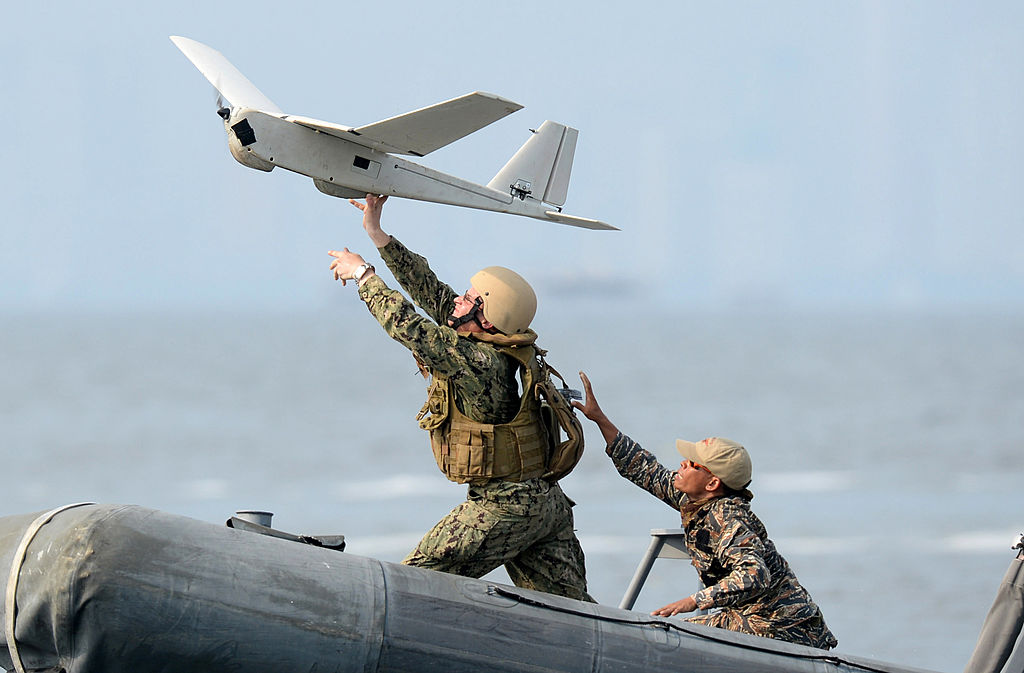Drones Prove Worth in Maritime Surveillance, Security
ADF STAFF
Collectively, Africa’s coastal countries are responsible for more than 13 million square kilometers of maritime territory, a huge undertaking that is beyond the capacity of most countries. Enter unmanned vehicles.
Countries are embracing the use of unmanned aerial vehicles (UAVs) and unmanned surface vehicles (USVs) to strengthen their ability to patrol and control their coastal waters. Drones allow for surveillance and documentation of piracy, illegal fishing and other activities with minimal human resources.
“One takeaway is the enhanced situational awareness from this technology expanding the range of sight in the field against targets in the field,” Nigerian drone pilot Ebunoluwa George Ojo-ami, a member of the Nigerian Maritime Academy and a volunteer with the Gulf of Guinea Maritime Institute, told ADF by email. “Compared to manned aircraft, drones offer relatively cheaper cost and can be designed to be fully autonomous or semiautonomous.”
As they weigh their options for adopting drone technology, nations can look to Ukraine for a model of a successful drone-based maritime program. Since Russia invaded Ukraine in February, the Ukrainian military has used UAVs and USVs as a force-multiplier to counter Russia in the Black Sea.
Ukraine’s 3-meter-long radio-controlled drone boats skim the surface of the water along the Crimean coast and harass Russia’s Black Sea fleet anchored at the occupied Ukrainian port of Sevastopol.
In October, drones destroyed one Russian vessel. A combined attack by air- and sea-based drones also damaged the flagship Admiral Makarov so severely it had to be removed from service for repairs.
Drone technology ranges from small, inexpensive, commercially available quadcopters to multimillion-dollar military-grade aerial vehicles.
Although drones primarily have been used over land, they’re becoming more attractive to overstretched maritime forces tasked with monitoring the vast, trackless ocean. Nigeria acquired 4 UAVs in 2021 as part of its Deep Blue maritime security project. The Gulf of Guinea, one of the busiest shipping areas in the world, saw 130 of the world’s 135 acts of piracy in 2020.
Bashir Yusuf Jamoh, director-general of the Nigerian Maritime Administration and Safety Agency, announced the new drones on Twitter.
“Our 4 Unmanned Air Vehicles will ensure that we have a sustainable round-the-clock surveillance system from the sky furnishing real-time information for timely action to keep our waters safe for shipping and seafarers,” he said.
Seychelles has supplemented its patrol boats with drones that use artificial intelligence to monitor fishing vessels operating in its 1.3 million-square-kilometer exclusive economic zone (EEZ).
“We can see how drone technology works together seamlessly with ground personnel, also integrating into and communicating with their security systems,” Ojo-ami of Nigeria said. “Drones are easily adapted to most existing security software, so adding a security drone to an existing operation is a relatively seamless process.”
By boosting their own capacity for coastal security, African nations can rely less on international partners, according to Alberta Ama Sagoe, executive director of the Gulf of Guinea Maritime Institute, writing for Chatham House.
“Enhanced continental coordination, consistency and leadership can help Africa’s maritime endowment become a resource that can bring sustainable benefit across the continent,” Sagoe wrote.
Outfitting Africa’s maritime security agencies with drones can be a challenge, Ojo-ami said.
Drones require new legislation from governments and budgets to pay for equipment and trained personnel. Drones also are at risk of electronic jamming, hacking and other countermeasures. Small, inexpensive drones are easy to get but have limited range and short battery life. Sturdier drones are much more expensive and harder to acquire.
Despite the obstacles, African nations would be wise to give unmanned vehicles a prominent role in their maritime security, Ojo-ami said.
“Innovation is critical to growth,” he said. “It requires bold wagers and a willingness to persevere despite setbacks, criticism and uncertainty.”


Comments are closed.